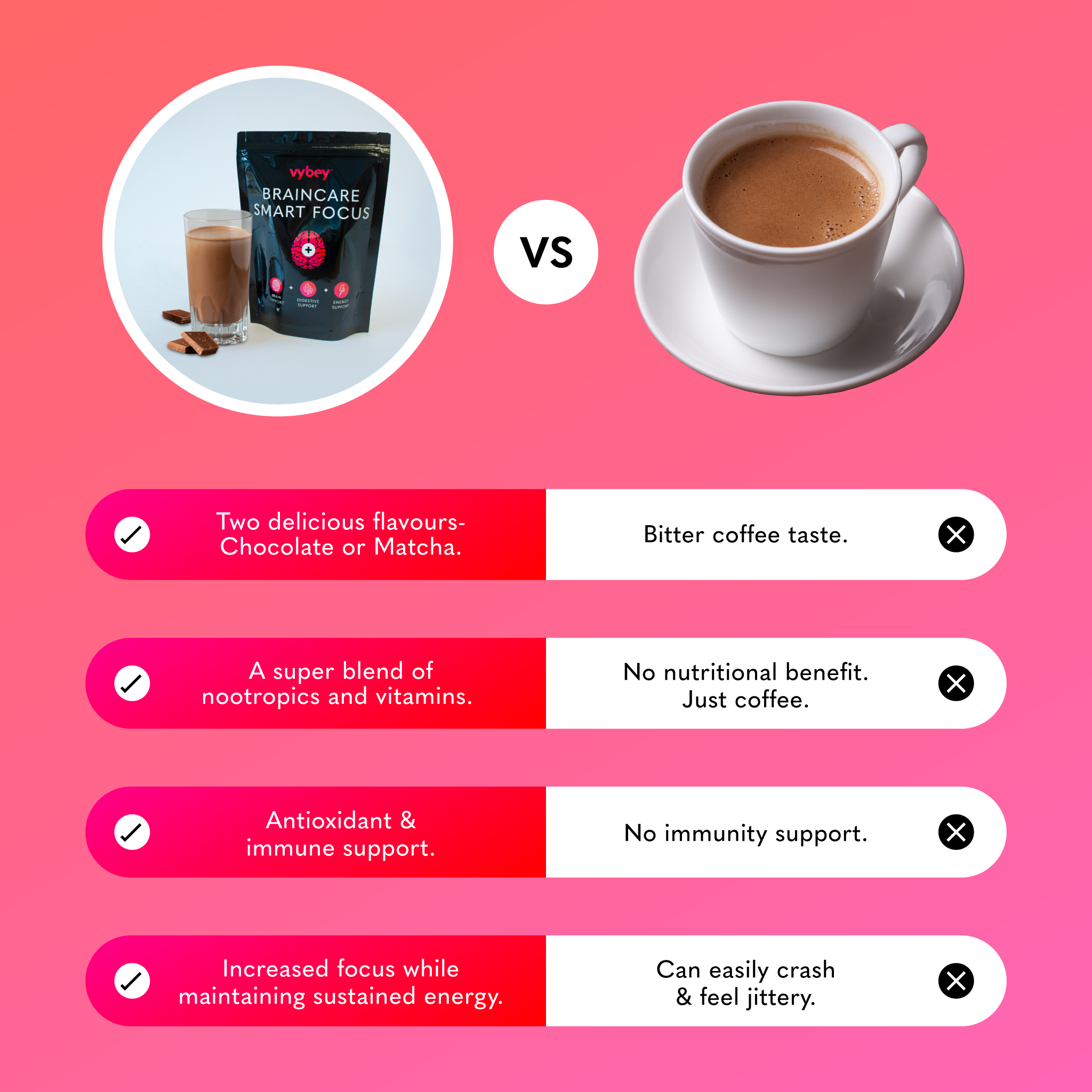Natural nootropics like lion's mane stimulate the brain in multiple ways, from increasing blood flow and oxygenation to protecting neurons from inflammation [1].
The question of whether they "work" comes down to what you want from them – better sleep, greater concentration, less stress, and it's all relative to the individual; everyone is different, so we need to look at trials and studies to see what's what.
We'll do just that below using lion's mane as the primary example and caffeine and ginseng as complimentary natural nootropics (among others).
Nootropics for better sleep
Supplementing with lion's mane mushroom for 8 weeks reduced sleep disorders by 34.4%, as measured by the SCL-90 test [2]. Notably, the benefits persisted after an 8-week washout, with sleep disorders remaining 39.1% lower than baseline.
Patients with sleep disorders saw massive improvements in sleep quality, with supplementation decreasing scores from 2.06 ± 0.16 to 1.15 ± 0.18, with the effect being maintained at 1.27 ± 0.19 after washout.
The study found that lion's mane significantly increased serum pro-BDNF levels after 8 weeks. BDNF is crucial for neurogenesis, brain plasticity, and regular sleep architecture.
The mushroom also reduced depression by 34.9-36% and anxiety by 49.6-41.9% after supplementation, with effects persisting after washout.
Conclusion
Given the strong correlation between mood disorders and sleep disturbances, lion's mane likely directly and indirectly benefits sleep by alleviating these comorbidities – although more studies are necessary for a consensus.
Lion's mane likely improves sleep by increasing levels of pro-BDNF (brain-derived neurotrophic factor precursor) and the pro-BDNF/BDNF ratio.
Nootropics for better concentration

Several natural nootropic substances—lion’s mane, choline, caffeine, and l-theanine — show promise for enhancing concentration and focus [3].
Choline supports your nervous system, brain and the formation of cell membranes. An essential nutrient it improves and positively impacts your mood, memory, muscle control etc. [4]
Our Braincare Smart Focus contains choline with other vital nutrients like caffeine. l-theanine, lion’s mane and reishi that not only allow for better concentration but help with brain fog.
Combining l-theanine and caffeine can be highly beneficial as you get the usual benefits of a caffeinated beverage like coffee without the jitters with an additional supercharge from the l-theanine which enhances focus.
Conclusion
Nootropics are concentration boosters, with choline being particularly potent for focus. Other effects like memory and anxiety reduction look promising.
Nootropics for less stress
A randomised, double-blind, placebo-controlled pilot study [5] found that supplementation with lion's mane showed some promise in reducing subjective stress in healthy young adults after 28 days, with a trend towards reduced scores on the Stress Visual Analog Scale (VAS) in the lion's mane group compared to placebo after the intervention period.
41 healthy adults aged 18-45 were randomly selected to receive either 1.8 g/day of lion's mane mushroom extract or a placebo for 28 days, and stress was assessed using the Stress VAS at baseline and after the supplementation period.
The effect on the Stress VAS did not quite reach statistical significance, but the authors noted it as a promising trend warranting further investigation, suggesting that lion's mane may potentially reduce subjective stress in healthy young people.
No effects on stress were reported after a single dose, with stress reduction seen after 28 days of supplementation – meaning chronic dosing may be necessary for lion's mane to exert any stress-relieving effects.
Conclusion
Lion's mane reduces stress in healthy adults with a trend towards lower stress scores after 28 days – meaning that monthly supplementation is best for stress relief.
Nootropics for immunity
Mice studies [6] show that a diet enriched with lion's mane polysaccharides puts mice's immune systems into overdrive, boosting immune cells like lymphocytes, macrophages, and natural killer cells—crucial players in fighting off infections and keeping the body healthy.
But here's where it gets exciting - the study suggests that HEP works its magic primarily by supercharging the immune system in the gut.
The intestinal lining is one of the body's first lines of defence, coming into contact with all sorts of foreign particles from food and microbes.
HEP was found to ramp up the secretion of a specialised antibody called secretory immunoglobulin A (SIgA) in the gut lining - SIgA acts as a vigilant guardian, neutralising potential threats before they can cause trouble. What's more, HEP activates critical signalling pathways in the intestine that help regulate immune responses.
Now, let's introduce Reishi mushroom into the discussion. Studies have shown that Reishi mushroom, another well-known medicinal mushroom, also possesses remarkable immunomodulatory properties. Like lion's mane, Reishi mushroom polysaccharides have been found to enhance various aspects of immune function, including boosting immune cell activity and promoting the production of key immune molecules.
Our Braincare Smart Focus contains both lion’s mane and reishi mushroom, harnessing their immune-modulating compounds such as beta-glucans and polysaccharides, to support overall immune health and cognitive function.
Conclusion
Combining the benefits of both lion's mane and reishi mushrooms could potentially offer synergistic effects, further enhancing overall immune function. However, it's important to note that the current study only examines the effects in mice, and further research is needed to determine the full extent of these mushrooms' immunomodulatory effects in humans.
How Do Nootropics Work?

A study looking into the effects of nootropics [7] found a multi-pronged approach to cognitive enhancement with the effects differing between natural and synthetic products.
Many nootropics act as vasodilators, increasing blood flow and the supply of oxygen and glucose to the brain and enhancing overall brain metabolism and energy production in neuronal cells.
Nootropics influence neurotransmitter production, release, or breakdown through the cholinergic system by providing precursors for acetylcholine synthesis or inhibiting its degradation.
Nootropics can stimulate the growth of new neurons (neurogenesis) and synapses (synaptogenesis), especially in areas like the hippocampus, which are critical for learning and memory
Some nootropics protect neurons from damage and death caused by various insults like hypoxia, toxins, amyloid proteins, and other pathological processes, helping maintain optimal neuronal function.
Wrapping Up
There's compelling clinical evidence from human trials and studies that nootropics (particularly lion's mane) can improve sleep and concentration, reduce stress, and protect the brain from free radical activity.
The effects on our immunity are less well known. Only animal studies show positive effects, and there are no concrete human studies.
vybey Lion's Mane is natural and vegan, made from Lion's Mane Mushroom Fruiting Body Extract 10:1 with 100% purity. The powder version is perfect for adding to your meals while the capsule is best when you are on the move.
vybey’s newest addition - Braincare Smart Focus - A coffee alternative focussed on brain health optimisation and mental clarity is a nootropic lover’s dream!
Say goodbye to brain fog and caffeine crashes or jitters. Our Braincare Smart Focus has been engineered to provide sustained mental energy and clarity throughout the day.
It’s worth giving lion’s mane and our Braincare Smart Focus a go, as well as other nootropics like creatine for additional positive effects.






Comments (0)
Back to vybey blogs